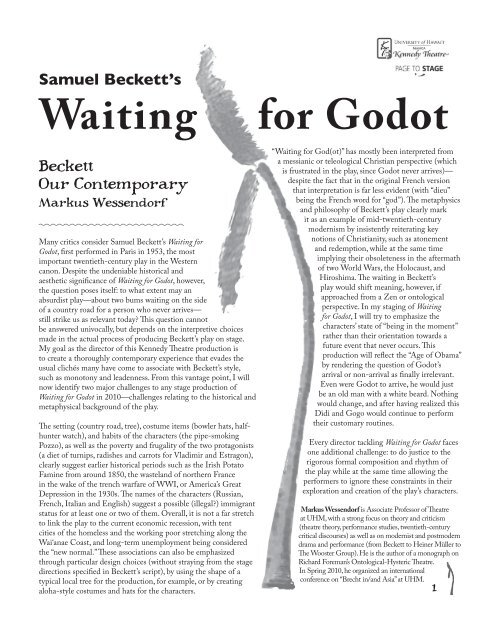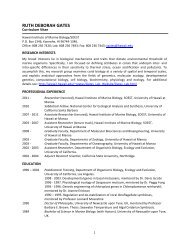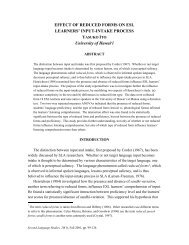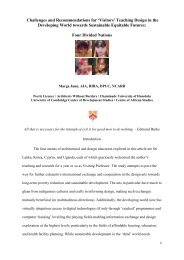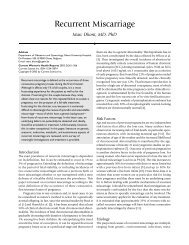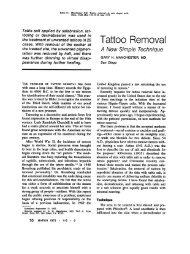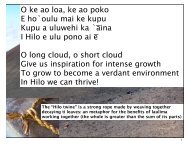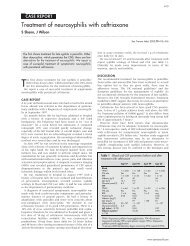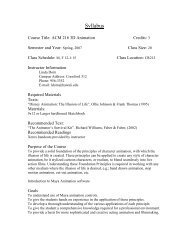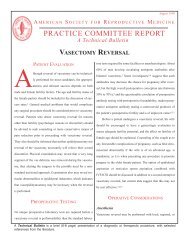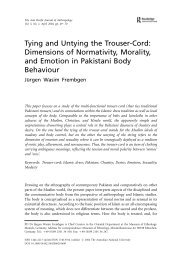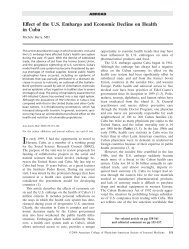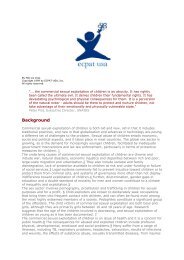Samuel Beckett's Waiting for Godot - University of Hawaii
Samuel Beckett's Waiting for Godot - University of Hawaii
Samuel Beckett's Waiting for Godot - University of Hawaii
Create successful ePaper yourself
Turn your PDF publications into a flip-book with our unique Google optimized e-Paper software.
<strong>Samuel</strong> Beckett’s<br />
<strong>Waiting</strong> <strong>for</strong> <strong>Godot</strong><br />
Many critics consider <strong>Samuel</strong> Beckett’s <strong>Waiting</strong> <strong>for</strong><br />
<strong>Godot</strong>, � rst per<strong>for</strong>med in Paris in 1953, the most<br />
important twentieth-century play in the Western<br />
canon. Despite the undeniable historical and<br />
aesthetic signi� cance <strong>of</strong> <strong>Waiting</strong> <strong>for</strong> <strong>Godot</strong>, however,<br />
the question poses itself: to what extent may an<br />
absurdist play—about two bums waiting on the side<br />
<strong>of</strong> a country road <strong>for</strong> a person who never arrives—<br />
still strike us as relevant today? � is question cannot<br />
be answered univocally, but depends on the interpretive choices<br />
made in the actual process <strong>of</strong> producing Beckett’s play on stage.<br />
My goal as the director <strong>of</strong> this Kennedy � eatre production is<br />
to create a thoroughly contemporary experience that evades the<br />
usual clichés many have come to associate with Beckett’s style,<br />
such as monotony and leadenness. From this vantage point, I will<br />
now identify two major challenges to any stage production <strong>of</strong><br />
<strong>Waiting</strong> <strong>for</strong> <strong>Godot</strong> in 2010—challenges relating to the historical and<br />
metaphysical background <strong>of</strong> the play.<br />
� e setting (country road, tree), costume items (bowler hats, halfhunter<br />
watch), and habits <strong>of</strong> the characters (the pipe-smoking<br />
Pozzo), as well as the poverty and frugality <strong>of</strong> the two protagonists<br />
(a diet <strong>of</strong> turnips, radishes and carrots <strong>for</strong> Vladimir and Estragon),<br />
clearly suggest earlier historical periods such as the Irish Potato<br />
Famine from around 1850, the wasteland <strong>of</strong> northern France<br />
in the wake <strong>of</strong> the trench warfare <strong>of</strong> WWI, or America’s Great<br />
Depression in the 1930s. � e names <strong>of</strong> the characters (Russian,<br />
French, Italian and English) suggest a possible (illegal?) immigrant<br />
status <strong>for</strong> at least one or two <strong>of</strong> them. Overall, it is not a far stretch<br />
to link the play to the current economic recession, with tent<br />
cities <strong>of</strong> the homeless and the working poor stretching along the<br />
Wai‘anae Coast, and long-term unemployment being considered<br />
the “new normal.” � ese associations can also be emphasized<br />
through particular design choices (without straying from the stage<br />
directions speci� ed in Beckett’s script), by using the shape <strong>of</strong> a<br />
typical local tree <strong>for</strong> the production, <strong>for</strong> example, or by creating<br />
aloha-style costumes and hats <strong>for</strong> the characters.<br />
“<strong>Waiting</strong> <strong>for</strong> God(ot)” has mostly been interpreted from<br />
a messianic or teleological Christian perspective (which<br />
is frustrated in the play, since <strong>Godot</strong> never arrives)—<br />
despite the fact that in the original French version<br />
that interpretation is far less evident (with “dieu”<br />
being the French word <strong>for</strong> “god”). � e metaphysics<br />
and philosophy <strong>of</strong> Beckett’s play clearly mark<br />
it as an example <strong>of</strong> mid-twentieth-century<br />
modernism by insistently reiterating key<br />
notions <strong>of</strong> Christianity, such as atonement<br />
and redemption, while at the same time<br />
implying their obsoleteness in the aftermath<br />
<strong>of</strong> two World Wars, the Holocaust, and<br />
Hiroshima. � e waiting in Beckett’s<br />
play would shift meaning, however, if<br />
approached from a Zen or ontological<br />
perspective. In my staging <strong>of</strong> <strong>Waiting</strong><br />
<strong>for</strong> <strong>Godot</strong>, I will try to emphasize the<br />
characters’ state <strong>of</strong> “being in the moment”<br />
rather than their orientation towards a<br />
future event that never occurs. � is<br />
production will re� ect the “Age <strong>of</strong> Obama”<br />
by rendering the question <strong>of</strong> <strong>Godot</strong>’s<br />
arrival or non-arrival as � nally irrelevant.<br />
Even were <strong>Godot</strong> to arrive, he would just<br />
be an old man with a white beard. Nothing<br />
would change, and after having realized this<br />
Didi and Gogo would continue to per<strong>for</strong>m<br />
their customary routines.<br />
Every director tackling <strong>Waiting</strong> <strong>for</strong> <strong>Godot</strong> faces<br />
one additional challenge: to do justice to the<br />
rigorous <strong>for</strong>mal composition and rhythm <strong>of</strong><br />
the play while at the same time allowing the<br />
per<strong>for</strong>mers to ignore these constraints in their<br />
exploration and creation <strong>of</strong> the play’s characters.<br />
Markus Wessendorf is Associate Pr<strong>of</strong>essor <strong>of</strong> � eatre<br />
at UHM, with a strong focus on theory and criticism<br />
(theatre theory, per<strong>for</strong>mance studies, twentieth-century<br />
critical discourses) as well as on modernist and postmodern<br />
drama and per<strong>for</strong>mance (from Beckett to Heiner Müller to<br />
� e Wooster Group). He is the author <strong>of</strong> a monograph on<br />
Richard Foreman’s Ontological-Hysteric � eatre.<br />
In Spring 2010, he organized an international<br />
conference on “Brecht in/and Asia” at UHM.<br />
1
Given <strong>Godot</strong>’s current popularity and its current reputation<br />
<strong>for</strong> being the groundbreaking work <strong>of</strong> modern theatre, it’s<br />
surprising how many people left the early per<strong>for</strong>mances<br />
and how many actors refused the roles.<br />
Th e play opened in Paris on January 5, 1953 and annoyed<br />
much <strong>of</strong> its audience who were “baffl ed, bored, irritated.”<br />
Others found the play pretentious (Graver 10). But a<br />
few early reviewers perceived the importance <strong>of</strong> the play,<br />
and a German version opened at a major Berlin theatre<br />
later in the same year. At the London opening in August<br />
1955, Peter Bull (who played Pozzo) recalls, “Waves <strong>of</strong><br />
hostility came whirling over the footlights, and the mass<br />
exodus, which was to <strong>for</strong>m such a feature <strong>of</strong> the run <strong>of</strong><br />
the piece, started soon after the curtain had risen” (qtd. in<br />
Graver 12-3). John Gielgud had dismissed the play as “a<br />
load <strong>of</strong> old rubbish,” dissuading the actors Alec Guinness<br />
and Ralph Richardson from taking on the leads. Th us<br />
Richardson turned down what he now calls “the greatest<br />
play <strong>of</strong> my lifetime” (qtd. in Graver 12). Once again, the<br />
critics saved the production. Although a third <strong>of</strong> the<br />
audience typically walked out after the fi rst act, <strong>Godot</strong><br />
simultaneously developed a cultic following.<br />
On to America. In 1955, the vaudevillian actor Bert<br />
Lahr (Th e Cowardly Lion in Th e Wizard <strong>of</strong> Oz) played<br />
Estragon. Th e play opened in—<strong>of</strong> all places—Miami and<br />
was billed as “the laugh sensation <strong>of</strong> two continents.”<br />
According to the director Alan Schneider, the opening<br />
T. Ryder Smith as Pozzo, J Kyle Manzay as Estragon, Wendell Pierce<br />
as Vladimir, and Mark McLaughlin as Lucky per<strong>for</strong>m in front <strong>of</strong> a<br />
Lower Ninth Ward house. Paul Chan, <strong>Waiting</strong> <strong>for</strong> <strong>Godot</strong> in New<br />
Orleans, 2007. Photo: Frank Aymami, courtesy Creative Time.<br />
2<br />
night audience was “ambulatory.” In fact, almost everyone<br />
had left the theatre by the fi nal curtain—with the notable<br />
exceptions <strong>of</strong> William Saroyan and Tennessee Williams<br />
yelling “Bravo!” across the empty seats (Graver 16). Th e<br />
play made it to Broadway in 1956. Th e critics were not<br />
kind in New York, but the public made <strong>Godot</strong> a sensation.<br />
Beckett was closely involved (either personally assisting<br />
the directors or consulting them by mail) in the fi rst<br />
French, Irish (1955), and American productions <strong>of</strong><br />
<strong>Waiting</strong> <strong>for</strong> <strong>Godot</strong>, and he later directed the play himself<br />
at Schiller Th eater Berlin (1975). With the play’s<br />
success, Beckett fi nally commented that <strong>Godot</strong> had been<br />
misunderstood, that there was no allegory or symbolism,<br />
no defi nition <strong>of</strong> anything.<br />
Th e end is to give artistic expression to something hitherto<br />
almost ignored – the irrational state <strong>of</strong> unknowingness<br />
wherein we exist, this mental weightlessness which is<br />
beyond reason (qtd. in Graver 18).<br />
Beckett did appreciate what he heard from reports<br />
and reviews about the 1957 per<strong>for</strong>mance <strong>of</strong> the play<br />
at Cali<strong>for</strong>nia’s San Quentin prison. Th e play resonated<br />
with the prisoners, and thus began a long tradition <strong>of</strong><br />
per<strong>for</strong>ming <strong>Godot</strong> in oppressive venues. Most recently, in<br />
November 2007, <strong>Waiting</strong> <strong>for</strong> <strong>Godot</strong> was staged <strong>for</strong> free in<br />
fi ve site-specifi c locations in hurricane-ravaged districts <strong>of</strong><br />
New Orleans.<br />
Given the long, ambivalent, provocative and puzzling<br />
production history <strong>of</strong> this play, we can only wait <strong>for</strong><br />
<strong>Godot</strong>, or we can walk out. But consider waiting, on the<br />
advice <strong>of</strong> Sunday Times critic Harold Hobson.<br />
Go and see <strong>Waiting</strong> <strong>for</strong> <strong>Godot</strong>. At the worst you will<br />
discover a curiosity, a four-leafed clover, a black tulip; at<br />
the best, something that will securely lodge in a corner <strong>of</strong><br />
your mind <strong>for</strong> as long as you live. (qtd. in Graver 13)<br />
Reference<br />
Graver, Lawrence. Beckett: <strong>Waiting</strong> <strong>for</strong> <strong>Godot</strong>. 2nd Edition.<br />
Cambridge and New York: Cambridge UP, 2004.<br />
Brenda Machosky is an Assistant Pr<strong>of</strong>essor <strong>of</strong> English and<br />
Humanities at <strong>University</strong> <strong>of</strong> Hawai`i West O`ahu. A member<br />
<strong>of</strong> the Shakespeare Association <strong>of</strong> America, Machosky teaches<br />
courses in Shakespeare, Early English Literature, World<br />
Literature, writing, and drama. She recently published Th inking<br />
Allegory Otherwise, an edited collection <strong>of</strong> essays, with Stan<strong>for</strong>d<br />
<strong>University</strong> Press. Her book Faces <strong>of</strong> Allegory is <strong>for</strong>thcoming with<br />
Fordham <strong>University</strong> Press.
In the fi rst act <strong>of</strong> <strong>Waiting</strong> <strong>for</strong> <strong>Godot</strong>, Vladimir wryly says<br />
to Estragon, “You should have been a poet.” Estragon<br />
replies, “I was. (Gesture towards his rags.) Isn’t that<br />
obvious?” (6). Th e Irish playwright <strong>Samuel</strong> Beckett pokes<br />
fun at himself and at all <strong>of</strong> us through his characters,<br />
while creating a dramatic arena in which to contemplate<br />
deeply pr<strong>of</strong>ound issues. Beckett’s humor draws on a range<br />
<strong>of</strong> inspirations, from the comedic elements <strong>of</strong> silent fi lms,<br />
to his own Irish upbringing, to the turbulent political<br />
background <strong>of</strong> postwar Europe.<br />
Characters named Vladimir, Estragon, Pozzo and Lucky<br />
may seem remote to the modern experience in the world<br />
<strong>of</strong> iPhone and Facebook. But the bond Vladimir and<br />
Estragon share, based on grudging aff ection and resentful<br />
mutual need, is familiar to many <strong>of</strong> us. In <strong>Waiting</strong> <strong>for</strong><br />
<strong>Godot</strong> one can see the poignant slapstick comedy <strong>of</strong> Buster<br />
Keaton and Laurel and Hardy, as well as shades <strong>of</strong> the<br />
modern situation comedy, such as Th e Honeymooners, I<br />
Love Lucy, Seinfeld, or even Two and A Half Men. Beckett<br />
created characters humorously “stuck together,” frustrated,<br />
enduring, exploding, and fundamentally going nowhere<br />
with their lives.<br />
Beckett is said to have possessed a keen sense <strong>of</strong> humor<br />
and kindness, but he has also been described as private,<br />
taciturn and gloomy. “Beckett perceived that those dark<br />
and tumultuous aspects <strong>of</strong> his own personality which<br />
he had always ‘struggled to keep under’ were in reality<br />
his most precious possession” (Graver 7). Although<br />
raised in the prosperous Protestant enclave <strong>of</strong> Foxrock,<br />
Dublin, Beckett still possessed that tragic, quintessentially<br />
survivalist Irish humor more <strong>of</strong>ten associated with the<br />
disenfranchised Catholics. In conversation with the critic<br />
Lawrence Harvey, Beckett was said to have suggested,<br />
“perhaps it is an Irish trait to be skeptical both <strong>of</strong> the<br />
natural world as given and <strong>of</strong> the perceiving subject as<br />
well” (Graver 8).<br />
Beckett has been compared to James Joyce in his use <strong>of</strong><br />
humor: “Like Joyce, Beckett observes his fellow creatures,<br />
and fi nds comic material in their confusions” (Don Nilsen<br />
164). Both displayed the Irish love <strong>of</strong> irreverent, upending<br />
word play, such as Joyce’s phrase, “Th at’s enough<br />
<strong>of</strong> fi nicking with Finnigan and fi ddling with his faddles.”<br />
Beckett’s wordplay can be seen in the French etymology<br />
<strong>of</strong> the word “<strong>Godot</strong>.” According to Graver, Godillot can<br />
mean “‘hobnailed boot’ or shapeless old shoe’; and godasses<br />
are ‘military boots’ [. . .] Goder means to pucker” (45).<br />
Jonathan Egged as Vladimir and Chi Ho Law as Estragon in the 2003<br />
Earle Ernst Lab Theatre production <strong>of</strong> <strong>Waiting</strong> <strong>for</strong> <strong>Godot</strong>, directed in<br />
Kyogen style by Tim Gonzalez-Wiler.<br />
Th e reference to military boots connotes the devastating<br />
eff ects <strong>of</strong> the second World War. Th e war had ruptured<br />
trust in life; its shattering reverberation echoed in<br />
philosophy, literature, and art. Beckett’s increasingly dark<br />
post-war canvas remained punctured with the light <strong>of</strong><br />
humor, with physical comedy and with an objective look<br />
at human ridiculousness and pomposity. Vladimir says<br />
to Estragon, who has been fussing with his ill-fi tting<br />
boot: “Th ere’s man all over <strong>for</strong> you, blaming on his boots<br />
the faults <strong>of</strong> his feet” (4). Th is one line well characterizes<br />
the pithy, dark humor distilled in Beckett, which he<br />
assiduously used to ultimately reveal the human condition.<br />
References<br />
Beckett, <strong>Samuel</strong>. <strong>Waiting</strong> <strong>for</strong> <strong>Godot</strong>. New York: Grove Press,<br />
Inc., 1952, 1982.<br />
Graver, Lawrence. Beckett, <strong>Waiting</strong> <strong>for</strong> <strong>Godot</strong>. Cambridge:<br />
Cambridge <strong>University</strong> Press, 1989.<br />
McMillan, Dougland et al. Beckett in the Th eatre. London, New<br />
York: Riverrun Press, 1988.<br />
Nilsen, Aileen et al. Encyclopedia <strong>of</strong> 20 th Century American<br />
Humor. Westport, CT: Greenwood Press, 2000.<br />
Nilsen, Don. Humor in Irish Literature: A Reference Guide.<br />
Westport, CT: Greenwood Press, 1996.<br />
Born and raised in Dublin, Siobhán Ní Dhonacha is a MFA<br />
candidate at UHM. Siobhán is a novelist, play and screen<br />
writer, as well as a director and producer. She is currently<br />
working on her MFA thesis play L❤VE 2 , which will be<br />
staged at the Earle Ernst Lab Th eatre in March 2011.<br />
3
4<br />
To all mankind they were addressed, those cries still<br />
ringing in our ears! But at this place, at this moment <strong>of</strong><br />
time, all mankind is us, whether we like it or not.<br />
— Vladimir, <strong>Waiting</strong> <strong>for</strong> <strong>Godot</strong><br />
Asked whether the fact that he lived in France instead <strong>of</strong> his<br />
native Ireland and published in England signaled that he<br />
was no longer “an Irishman,” the playwright <strong>Samuel</strong> Beckett<br />
famously answered, “Au contraire.” Th e contrarian answer<br />
displays his classically sardonic humor, but it signifi cantly<br />
neither denies his Irish identity nor simply upholds it.<br />
For years, Beckett was read as a writer with no real<br />
national affi liation, one whose plays, including <strong>Waiting</strong><br />
<strong>for</strong> <strong>Godot</strong>, withhold direct markers that would orient us to<br />
time and place. Consequently, critics have taken his refusal<br />
to name his settings as indicative <strong>of</strong> the universally absurd<br />
condition <strong>of</strong> humanity, the inadequacy <strong>of</strong> language, and<br />
the waning <strong>of</strong> a belief in progress born <strong>of</strong> a civilization<br />
torn asunder by World War II. In other words, they locate<br />
Beckett in one version <strong>of</strong> mid-twentieth-century history.<br />
But what do we learn about the play if we take seriously<br />
his Irish background? Recently scholars have observed<br />
similarities between the literature coming from postcolonial<br />
countries and Ireland and note the ways that<br />
<strong>Waiting</strong> <strong>for</strong> <strong>Godot</strong> coincides with decolonization movements<br />
globally. Indeed in 1948–49 when Beckett was writing the<br />
play, the Republic <strong>of</strong> Ireland Act <strong>of</strong>fi cially ended executive<br />
authority by Great Britain over the twenty-six counties <strong>of</strong><br />
the Republic. Additionally, 1953, the year <strong>of</strong> the fi rst full<br />
production, also marks Cambodia’s independence from<br />
France.<br />
For Joseph Roach, the Irish potato famine haunts the play.<br />
Approximately one million Irish died from hunger-related<br />
illness during the famine, while another million emigrated.<br />
English landlords continued to export cash crops from<br />
the island while the Irish waited <strong>for</strong> relief that rarely<br />
came. Roach sees the spectral presence <strong>of</strong> the famine in<br />
the play’s parched and desolate landscape, its stunted tree<br />
and images <strong>of</strong> bones and a scant turnip, but also in the<br />
dislocation that Estragon and Vladimir experience. His<br />
reading echoes that <strong>of</strong> Vivian Mercier, who sees in Pozzo’s<br />
dress and speech a Victorian-era absentee landlord and in<br />
Lucky’s clothing the Irish peasant <strong>of</strong> Punch cartoons.<br />
By contrast, the Irish critic Declan Kiberd attempts<br />
to reconcile readings <strong>of</strong> the play that focus on its Irish<br />
references with those that understand it as the outgrowth<br />
<strong>of</strong> modernist sensibilities. Beckett saw in post-war<br />
J Kyle Manzay as Estragon, T. Ryder Smith as Pozzo, and Wendell<br />
Pierce as Vladimir per<strong>for</strong>m in the 2007 Classical Theatre <strong>of</strong> Harlem<br />
Production in New Orleans. Director: Christopher McElroen. Paul<br />
Chan, <strong>Waiting</strong> <strong>for</strong> <strong>Godot</strong> in New Orleans, 2007. Photo: Paul Chan,<br />
courtesy Creative Time.<br />
France, Kiberd argues, “vital lessons <strong>for</strong> Irish people” (550).<br />
In Vladimir’s speech that is the epigraph <strong>of</strong> this essay, <strong>for</strong><br />
example, Kiberd fi nds an admonition against Ireland’s<br />
neutrality during the war (542). But so too this critic notes<br />
Beckett elsewhere spoke <strong>of</strong> the particularly Irish “conception<br />
<strong>of</strong> humanity in ruins” and found in the Irish “an inkling <strong>of</strong> the<br />
terms in which our condition is to be thought again” (550).<br />
What is at stake in an insistence on the Irish context <strong>for</strong><br />
Beckett’s work, I believe, is not national pride or a place in<br />
an Irish canon but the sense that while absurdity might be a<br />
universal condition, it is not universally experienced in the same<br />
way. Even if the play is “no where,” its audiences, like Beckett<br />
himself, are located somewhere, and the play refl ects and<br />
refracts the specifi city <strong>of</strong> our locations and experiences as was<br />
the case in 2007 when <strong>Godot</strong> was produced with a Hurricane<br />
Katrina-ravaged New Orleans as the setting, a world where<br />
waiting enacted violence. We might, then, ask ourselves from<br />
the darkness <strong>of</strong> our seats in Kennedy Th eatre as we watch this<br />
production, “Where are we?” and “What are we waiting <strong>for</strong>?”<br />
References<br />
Kiberd, Declan. Inventing Ireland. Boston: Havard UP, 2003.<br />
Mercier, Vivian. Beckett/Beckett. Ox<strong>for</strong>d: Ox<strong>for</strong>d UP, 1977.<br />
Roach, Joseph. “”All the Dead Voices:’ the Landscape <strong>of</strong> Famine in<br />
<strong>Waiting</strong> For <strong>Godot</strong>.” Land/scape/Th eatre. Eds. Elinor Fuchs and Una<br />
Chaudhuri. Ann Arbor: U <strong>of</strong> Michigan P, 2002: 84-93.<br />
Laura E. Lyons is Associate Pr<strong>of</strong>essor and Graduate Director <strong>of</strong><br />
English at UHM where she teaches courses in cultural and postcolonial<br />
studies. Her scholarly work ranges from cultural politics<br />
<strong>of</strong> the Troubles in Northern Ireland to the pineapple in Hawai‘i.<br />
With Cynthia Franklin, she is the co-editor <strong>of</strong> a special issue <strong>of</strong><br />
Biography, “Personal Eff ects: Th e Testimonial Uses <strong>of</strong> Life Writing.”<br />
With Purnima Bose, she has co-edited the volume, Cultural<br />
Criticism and the Global Corporation.
Life’s not fair. Despite the centuries that separate<br />
Shakespeare’s Hamlet from Beckett’s <strong>Waiting</strong> <strong>for</strong> <strong>Godot</strong>,<br />
this message takes many <strong>for</strong>ms on the stage as in life.<br />
We desire meaning and order in life; sometimes we<br />
pretend that life is fair, even though we know it’s not.<br />
Like Estragon and Vladimir, some construct a reality<br />
that suspends the question <strong>of</strong> life’s fairness. Or others,<br />
like Hamlet, try their best to be fair, even in an unfair<br />
world. And yet, life remains unfair, unjust, inexplicable.<br />
Drama reminds us <strong>of</strong> this paradox. Plays that portray a<br />
meaningless world <strong>for</strong>ce us to focus on ourselves, on how<br />
human beings react to, engage with, and survive—even<br />
thrive—in such a world.<br />
Hamlet very directly takes on the issue <strong>of</strong> the human search<br />
<strong>for</strong> meaning. Th roughout the play, Hamlet searches <strong>for</strong><br />
certainty, and he will not act until he is sure he can be fair.<br />
Rather admirably, he wants to fi nd meaning <strong>for</strong> himself.<br />
Not even the words <strong>of</strong> his father’s ghost are suffi cient. Th is<br />
quest <strong>for</strong> the absolute, or at least some <strong>for</strong>m <strong>of</strong> assurance<br />
that the ghost’s account <strong>of</strong> events is correct, prevents Hamlet<br />
from acting decisively <strong>for</strong> much <strong>of</strong> the play (Jenkins).<br />
Even after he is sure <strong>of</strong> Claudius’ guilt, he himself wonders<br />
at his inability to act: “I do not know/ Why yet I live to<br />
say this thing’s to do,/Sith I have cause, and will, and<br />
Left to right: Adam Weiner as Vladimir, Roger Long as Lucky, Robert<br />
Harrison as Pozzo, and Gian Giacomo Colli as Estragon in the 1989<br />
UHM Lab Theatre production. Photo: James Giles.<br />
strength, and means/To do’t” (4.4.43-6). A spectator might<br />
simultaneously applaud Hamlet’s circumspection while<br />
being annoyed by his hesitancy. For much <strong>of</strong> the play,<br />
Hamlet does not move, and when he fi nally does, he dies.<br />
Even by the end <strong>of</strong> the play, it is not clear what Hamlet<br />
could have or should have done diff erently.<br />
Such plays show us that the world does not have to be<br />
meaningful to be interesting, or even, perhaps, that the<br />
quest <strong>for</strong> meaning can itself be meaningless. Th is is one<br />
way to understand <strong>Waiting</strong> <strong>for</strong> <strong>Godot</strong>. Many scholars and<br />
critics superimpose meaning on this play with allegorical<br />
interpretations that connect the play to a system outside<br />
<strong>of</strong> it—to politics, religion, philosophy, or social conditions.<br />
Beckett insisted, however, that such allegorical gestures<br />
were not his intent. And his characters continually express<br />
a resistance to meaning. Th e play is so unsettling—so<br />
“meaningless” —precisely because the human desire <strong>for</strong><br />
meaning is suspended. Didi and Gogo simply exist, just<br />
waiting <strong>for</strong> <strong>Godot</strong> (or not). <strong>Godot</strong> does not stand <strong>for</strong> God<br />
(at least not according to Beckett) (Knowlson 124) but<br />
it does perhaps stand <strong>for</strong> whatever meaning we desire.<br />
<strong>Waiting</strong> <strong>for</strong> <strong>Godot</strong> provokes us to think not about meaning<br />
but about how much the desire <strong>for</strong> it determines who we<br />
are and what we do.<br />
Long ago Aristotle realized that the things that distress<br />
us in life give us pleasure when mounted on the stage.<br />
Even unsettling representations are pleasurable because<br />
we learn from them. We recognize the human condition<br />
and simultaneously feel safely removed from it. Hamlet<br />
is a character with a rich and resonant psychology;<br />
he has inspired many a youth to dress all in black and<br />
ponder existential dilemmas. But faced with the pile <strong>of</strong><br />
bodies at the end <strong>of</strong> Hamlet, we may only gape without<br />
comprehension. Closer to our own time, <strong>Waiting</strong> <strong>for</strong> <strong>Godot</strong><br />
<strong>of</strong>f ers a more perverse pleasure. Th e despondency <strong>of</strong> the<br />
human condition comes even more to the <strong>for</strong>e. And yet,<br />
<strong>Godot</strong> can also be a more uplifting play. Th e play ends<br />
on a comic action, with Gogo’s pants falling down. And<br />
although everything tells these two that they should give<br />
up, “they do not move.”<br />
References<br />
Knowlson, James and Elizabeth, eds. Beckett Remembering,<br />
Remembering Beckett: A Centenary Celebration. New<br />
York: Arcade, 2006.<br />
Jenkins, Harold. “Introduction.” Th e Arden Shakespeare: Hamlet.<br />
London and New York: Methuen, 1982. 136-40.<br />
5
• Saturday November 13 2010 “Looking into <strong>Waiting</strong> <strong>for</strong> <strong>Godot</strong>”<br />
by Yining Lin<br />
Free to the public<br />
• Saturday December 4 2010 “For the Love <strong>of</strong> <strong>Godot</strong>: Th e<br />
Story Behind the Play” by Lindsay Timmington-McGahan<br />
Free to the public<br />
Times: 6:30 pm Location: Earle Ernst Lab Th eatre<br />
Panelists: Elisa Joy White, Ricardo D. Trimillos, Laura E. Lyons,<br />
Jonathan Kamakawiwo’ole Osorio, Jean Toyama; Moderator:<br />
Markus Wessendorf.<br />
Th e scholars will relate the production to our present moment,<br />
especially here in Hawai‘i.<br />
Sunday November 21 2010, 4:30 pm Earle Ernst Lab Th eatre<br />
Free to the public<br />
<strong>Waiting</strong> <strong>for</strong> <strong>Godot</strong> by <strong>Samuel</strong> Beckett<br />
Directed by Markus Wessendorf<br />
Kennedy Th eatre November 12, 13, 19, December 2, 4 at 7:30<br />
pm; November 21 at 2 pm<br />
All the World’s a Stage, a non-pr<strong>of</strong>i t theatre company originally<br />
based in Seattle, has recently moved to Hawai’i under the<br />
direction <strong>of</strong> UHM Associate Pr<strong>of</strong>essor <strong>of</strong> Acting Paul T. Mitri.<br />
Th e mission <strong>of</strong> AWS is to see and create theatre everywhere and<br />
make theatre accessible <strong>for</strong> all.<br />
Th e Hawai‘i Council <strong>for</strong> the Humanities (HCH) is a private<br />
nonpr<strong>of</strong>i t educational organization dedicated to supporting and<br />
promoting activities that further awareness <strong>of</strong> the worth and<br />
value <strong>of</strong> the humanities among the general public in Hawai‘i.<br />
Th e UHM Department <strong>of</strong> Th eatre and Dance is internationally<br />
recognized <strong>for</strong> the following focus areas: Asian Th eatre, Western<br />
Th eatre, Design, Youth Th eatre, Dance Education, Dance<br />
Ethnology, and Dance Choreography and Per<strong>for</strong>mance. Kennedy<br />
Th eatre’s Page to Stage program links Kennedy Th eatre productions<br />
to other classes and departments at the UHM campus and beyond.<br />
6<br />
BOOKS<br />
Beckett, <strong>Samuel</strong>. <strong>Waiting</strong> <strong>for</strong> <strong>Godot</strong>. Th e Complete Dramatic Works.<br />
London: Faber and Faber, 1986.<br />
Knowlson, James. Damned to Fame: Th e Life <strong>of</strong> <strong>Samuel</strong> Beckett.<br />
New York: Grove Press, 1996.<br />
Bloom, Harold, ed. <strong>Samuel</strong> Beckett’s <strong>Waiting</strong> <strong>for</strong> <strong>Godot</strong>. Bloom’s<br />
Modern Critical Interpretations. New York: Infobase<br />
Publishing, 2008.<br />
Dow Fehsenfeld, Martha and Lois More Overbeck, eds. Th e<br />
Letters <strong>of</strong> <strong>Samuel</strong> Beckett, Volume 1: 1929-1940. London:<br />
Cambridge UP, 2009. A collection <strong>of</strong> the author’s letters<br />
from 1929-1940.<br />
ONLINE RESOURCES<br />
“Lucky’s Th ought” http://www.samuel-beckett.net/Penelope/<br />
Pozzo_Lucky.html<br />
An in-depth look at Lucky’s famous monologue.<br />
“<strong>Waiting</strong> <strong>for</strong> <strong>Godot</strong> in New Orleans”<br />
http://www.creativetime.org/programs/archive/2007/chan/<br />
welcome.html<br />
A collaborative project between Paul Chan, Creative Time, and<br />
the Classical Th eatre <strong>of</strong> Harlem <strong>of</strong> a production <strong>of</strong> <strong>Waiting</strong> <strong>for</strong><br />
<strong>Godot</strong> in New Orleans.<br />
VIDEO<br />
Beckett on Film. Dir: Various. Ambrose Video: 2002. A collection<br />
<strong>of</strong> all <strong>of</strong> Beckett’s dramatic works on DVD.<br />
Th e Impossible Itself. Dir. Jacob Adams, 2008.<br />
http://www.newfi lmmakersonline.com/<br />
A documentary about the 1957 production <strong>of</strong> <strong>Waiting</strong> <strong>for</strong><br />
<strong>Godot</strong> at San Quentin Prison by the San Francisco Actor’s<br />
Workshop.<br />
Audience Guide Editor: Lurana Donnels O’Malley<br />
Audience Guide Assistant: Eleanor Svaton<br />
Audience Guide Designer: Laura Ruby<br />
Please see the Page to Stage website <strong>for</strong> additional educational<br />
materials and in<strong>for</strong>mation: www.hawaii.edu/theatre/stage/<br />
pagetostage/<br />
For more in<strong>for</strong>mation on educational events, contact KTPage@<br />
hawaii.edu<br />
For more in<strong>for</strong>mation on public per<strong>for</strong>mances <strong>of</strong> Hamlet and<br />
<strong>Waiting</strong> <strong>for</strong> <strong>Godot</strong> call Kennedy Th eatre Box Offi ce at 956-7655<br />
or purchase tickets online through etickethawaii.com/kennedy.html


